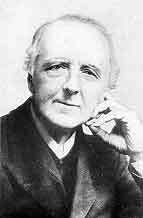 Below is an thoughtful discussion by one of the most Christ-centered theologian/scholar of our time. When Alan Johnson kindly asked me to contribute a chapter to How I Changed My Mind about Women in Leadership, I had to tell him that I had not changed my mind on this point, and thus could not contribute. All through my young life-from Mrs. Roy Rowan, at the first Baptist Church of Buffalo Missouri, to Mrs. Flood and others at Shiloh Baptist Church at Rover Missouri-those who had taught me most "at church" were women. Actually, I knew that, in many cases, there would have been no church at all if it hadn't been for women; and, beyond church, life in my environment was mainly anchored in strong and intelligent women who-often with little or nothing in the way of "credentials"-simply stood for what was good and right and directed others in the way of Christ.
Below is an thoughtful discussion by one of the most Christ-centered theologian/scholar of our time. When Alan Johnson kindly asked me to contribute a chapter to How I Changed My Mind about Women in Leadership, I had to tell him that I had not changed my mind on this point, and thus could not contribute. All through my young life-from Mrs. Roy Rowan, at the first Baptist Church of Buffalo Missouri, to Mrs. Flood and others at Shiloh Baptist Church at Rover Missouri-those who had taught me most "at church" were women. Actually, I knew that, in many cases, there would have been no church at all if it hadn't been for women; and, beyond church, life in my environment was mainly anchored in strong and intelligent women who-often with little or nothing in the way of "credentials"-simply stood for what was good and right and directed others in the way of Christ.
Of course I knew that in my church the "official" pastors were men, but the issue of women teaching men and "preaching" had not hardened in that time and place, and, if need required-as was frequently the case-certain women could do very well at "bringing a message." Also, I was fortunate to be in significant contact with Wesleyan and Holiness tendencies where women were in leadership roles-quite "officially." As I grew older, and began seriously to study the Bible and the Way of Christ, I of course became aware of the gender issues and of the biblical passages which, in the minds of some, occasion difficulties concerning "women preachers." But it seemed clear to me that those passages were not principles themselves, but were expressions of the principle that Christ-followers should be "all things to all men," in Paul's language. They were no more part of the righteousness and power of Christ than not eating blood or being saved by bearing children.
The contributors to this volume have, taken together, covered every point of theology, biblical interpretation, and spiritual life that is of substantial relevance to the issue of women in Christian leadership. They have done it with the best of scholarship, intelligence, sensitivity, pathos, and humor. If you have decided to work the matter through, you cannot find a better place to begin than by reading this book. It will bring light to your mind and joy to your heart-though at some points you will be saddened at how much hurt and harm can be imposed through warping the Gospel and its ministry into cultural legalism in the name of God. At the risk of overdoing what has already been done, I would like to emphasize three points.
First, those gifted by God for any ministry should serve in the capacities enabled by their gift, and human arrangements should facilitate their service and provide them the opportunities to serve. There is no suggestion whatsoever in scripture or the history of Christ's people that the gifts of the Spirit are distributed along gender lines. It is clearly something that does not even appear on the mental horizon of the inspired writers. And, if it had done so, can one even imagine that they would have failed to state it clearly? Especially if it is as important as those who oppose female leadership make it out to be. You have to put the fact that, in discussing the distribution and ministry of gifts by the Spirit, nothing is said about gender, down along side that fact that many men are allowed to serve in official roles that manifestly are not supernaturally gifted. Then you realize that official leadership roles, as widely understood now, are as much human artifacts as they are a divine arrangement.
Second, it is misguided and unhelpful to try to deal with the issue of women in leadership in terms of rights and equality alone. Rights and equality are not the main considerations involved, and we will make little progress in understanding or practice so long as they are allowed to define the terms of the discussion. Equality is an extremely crude instrument to apply to human relations, even in a secular context, and much more so in the context of spiritual life and ministry for Christ. People simply are not equal when it comes to their talents, to their ministerial gifts, or to their experiences with God. To try to work out arrangements in those terms is to accept a secular modal as the basis of a divine order, and to reduce leadership in the body of Christ to a level that omits the power of God.
It is not the rights of women to occupy "official" ministerial roles, nor their equality to men in those roles that set the terms of their service to God and their neighbors. It is their obligationsthat do so: obligations which derive from their human abilities empowered by divine gifting. It is the good they can do, and the duty to serve that comes from that, which impels them to serve in all ways possible. Women and men are indeed very different, and those differences are essential to how God empowers each to induce the Kingdom of God into their specific life setting and ministry. What we lose by excluding the distinctively feminine from "official" ministries of teaching and preaching is of incalculable value. That loss is one of a few fundamental factors which account for the astonishing weakness of "the Church" in the contemporary context.
Third, the exclusion of women from "official" ministry positions leaves women generally with the impression that there is something wrong with them. Perhaps that is a mistaken inference on their part, and some may manage to work around it without being deeply affected. But if God indeed excludes women from leadership of the Church, there must be some reason why he does. What could it be? And if leadership, speaking, etc. is good work, and work manifestly in need of good workers, what, exactly, is it about a woman that God sees and says: "That won't do." Or did he just flip a coin and men won? This line of questioning of course affects all women, and not just those with aspirations to official ministry positions. It is noteworthy what a hard time those who oppose leadership by women have in saying exactly what it is about women that excludes them from such positions, and how that puts an unbearable weight upon what was already a very weak hermeneutic.
So the issue of women in leadership is not a minor or marginal one. It profoundly affects the sense of identity and worth on both sides of the gender line; and, if wrongly grasped, it restricts the resources for blessing, through the Church, upon an appallingly needy world. The contributors to this volume have served well in allowing us to see the paths of study and experience through which their minds were changed, and may the change abound.
http://www.dwillard.org/articles/artview.asp?artID=154


















